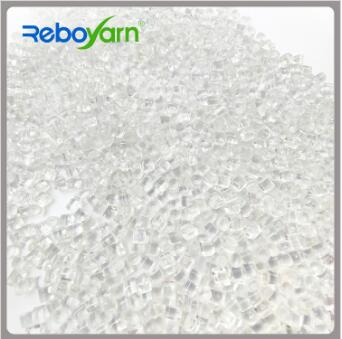How do recycled polyester chips contribute to sustainability goals and circular economy initiatives?
2023-10-18
Recycled polyester chips play a significant role in advancing sustainability goals and promoting circular economy initiatives in several ways:
1. Resource Conservation:
- Reduced Virgin Resource Consumption: The use of recycled polyester chips reduces the demand for virgin petrochemical-based materials, conserving valuable natural resources like petroleum and reducing the environmental impact of resource extraction.
2. Waste Diversion and Reduction:
- Landfill Diversion: Recycled polyester chips divert polyester waste from landfills, helping to reduce the volume of plastic waste ending up in disposal sites.
- Extended Product Lifespan: By recycling polyester products and materials, recycled polyester chips enable products to have a second life, extending their usability and reducing the need for replacements.
3. Energy and Emission Reduction:
- Lower Energy Consumption: The production of recycled polyester chips typically consumes less energy compared to the production of virgin polyester chips, resulting in reduced greenhouse gas emissions.
- Air Quality Improvement: Reduced energy consumption in recycling processes contributes to improved air quality and lower pollution levels.
4. Reduction in Water Usage:
- Conservation of Water Resources: Recycling polyester chips generally requires less water compared to the production of virgin polyester, which can involve extensive water use in petrochemical refining and polymerization.
5. Promotion of Circular Economy:
- Closed-Loop Systems: The use of recycled polyester chips aligns with the principles of a circular economy by extending the lifespan of polyester products and materials, reducing waste, and promoting reuse and recycling.
6. Consumer Awareness and Demand:
- Sustainability Preference: Consumers increasingly prefer products made from recycled materials, driving demand for eco-friendly and sustainable options.
7. Reduction of Environmental Impact:
- Lower Environmental Footprint: By using recycled materials, industries and products can reduce their environmental footprint, contributing to more sustainable production and consumption patterns.
8. Innovation and Sustainable Practices:
- Encouraging Innovation: The adoption of recycled materials encourages innovation in recycling technologies, product design, and sustainable practices, fostering a culture of continuous improvement.
9. Reduced Pollution:
- Mitigating Pollution: The recycling of polyester waste reduces the potential for environmental pollution associated with landfill disposal or the incineration of waste materials.
10. Resource Efficiency:
- Efficient Use of Resources: Recycling polyester chips embodies the efficient use of existing resources, as polyester waste is transformed into a valuable raw material for new products.
11. Economic Benefits:
- Job Creation: Recycling facilities and the industries that use recycled polyester chips can create jobs and stimulate economic growth, contributing to local and regional development.
12. Sustainability Certifications:
- Certification Standards: The use of recycled materials often aligns with sustainability and eco-labeling standards, allowing products to attain certifications that demonstrate their environmentally friendly attributes.
13. Corporate Responsibility:
- Corporate Sustainability Goals: Many companies and brands incorporate the use of recycled materials as part of their sustainability commitments, showcasing their dedication to responsible practices.
Recycled polyester chips serve as a tangible example of how recycling and circular economy principles can be applied to the textile and manufacturing industries, reducing waste, conserving resources, and minimizing environmental impact. As sustainability and circular economy initiatives gain prominence globally, the adoption of recycled materials like polyester chips is expected to continue to grow.



